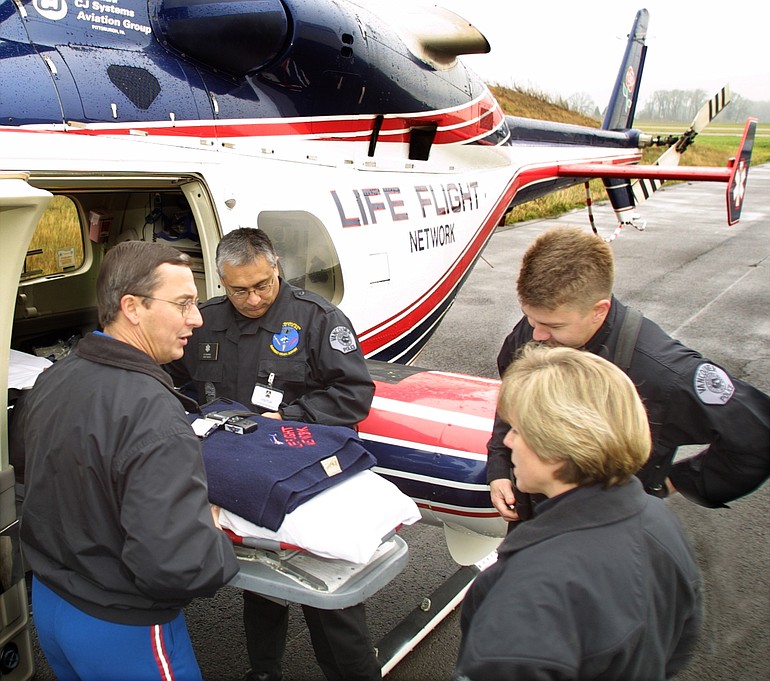Former Vancouver Police Officer Navin Sharma, who in 2008 settled a federal racial discrimination lawsuit against the department for $1.65 million, died Dec. 24 at his Portland home.
Sharma, who was diagnosed with inoperable pancreatic cancer a month after his settlement was reached, was 54.
He’s survived by his wife, Debby.
Friends on Tuesday said Sharma will be remembered for his commitment to public service.
Scott Blankenship, a Seattle attorney who represented Sharma along with Vancouver attorney Greg Ferguson, said he spoke to Sharma in late November.
“He was still courageous and still hopeful, and incredibly -upbeat,” Blankenship said. “Obviously- he was in a lot of pain, but he was really a fighter.”
Ferguson said when Sharma was diagnosed in 2008 he was given six to eight months to live.
“He did everything he could to try to beat it,” Ferguson said.
Sharma, known for his -innovation on the police force in getting victims medical assistance as quickly as possible, was also known as someone who would go out of his way to research and remedy friends’ ills.
“He was always there to help,” said Ferguson, recalling a time when Sharma helped him receive treatment for painful back spasms. “That was the healer part of Navin that was just amazing to see. That nurse’s training would kick in … he would just take time to make sure you were feeling better.”
Officer Ryan Martin, president of the Vancouver Police Officers Guild, said he had the -opportunity to work with Sharma, who joined the force in 1997, in the traffic unit.
“He exemplified a person who truly had a compassion for others,” Martin said. “He was a great guy, and he’s going to be missed by many.”
Sharma’s settlement led to the city hiring a consulting firm to do a departmental review.
The firm found significant problems with poor morale, inadequate communication, organizational dysfunction and labor-management unrest.
Sharma’s lawsuit “helped us to at least identify the internal issues we’ve got,” Martin said. “He was willing to stand up for those who wouldn’t, or couldn’t, stand up for themselves.”
In all, Sharma received three settlements after filing claims related to his employment.
In 2001, the city paid $287,000 to settle a claim that Sharma had been harassed since his 1998 testimony in an internal affairs investigation about two sergeants.
A transcript of Sharma’s supposedly confidential testimony was leaked, and he was labeled a snitch. The city offered Sharma an additional $200,000 to leave, but he chose to keep his job.
A few years later, Sharma received $90,000 in a settlement from Clark Regional Emergency Services Agency. Some 911 dispatchers had mocked Sharma by broadcasting a recording of a speaker with an East Indian accent.
One sergeant wrote in his affidavit that the recording was derogatory and ethically demeaning: “I could not believe that someone would actually broadcast this over a law enforcement radio for all to hear. I almost quit that day in disgust.”
After Sharma was fired in 2006 for making errors in drunken driving reports, officers wrote in affidavits the inadvertent errors were caused by “cutting and pasting” from a template used to write reports on standard drunken driving arrests.
Officers said cutting-and-pasting was common practice and Sharma was singled out.
Had Sharma’s federal lawsuit gone to trial, jurors would have heard unflattering testimony about Southwest Washington’s largest law enforcement agency.
More than 30 officers, from rank and file to command staff, had planned to testify that Sharma was treated unfairly.
Then-City Manager Pat McDonnell said the city settled with Sharma to avoid further litigation costs and more disruption to the police department.
As a condition of the settlement, which ranked as the largest reported discrimination settlement involving a single plaintiff in the Pacific Northwest, Sharma’s personnel file was changed to say he retired.
SWAT medic
Before Sharma made headlines for his lawsuit he was known for his innovation.
Sharma started Clark County’s SWAT medic program, officially called Tactical Emergency Medical Support, or TEMS.
Sharma, who kept a part-time job as a registered emergency room trauma nurse after becoming a police officer, started TEMS so skilled medical care could be administered in SWAT “hot zones” where paramedics couldn’t readily go because of the risks involved.
The TEMS unit was the first police-based team in Washington to offer advanced life support techniques in hot zones, and Sharma went on to contribute to a textbook on the subject.
Emergency medicine and law enforcement were Sharma’s second and third careers.
A native of India, Sharma moved to Alaska in the mid-1970s and earned degrees in geological and petroleum engineering from University of Alaska Fairbanks.
Sharma was working as a petroleum engineer in 1986 when he came across a horrific traffic accident. A car had rolled over on an icy road. Both parents and one child died; a second child survived.
“It was a pretty helpless feeling, standing there not being able to do anything for those folks,” Sharma told The Columbian in 2001.
Sharma moved to Portland and went to nursing school at Oregon Health and Science University.
He eventually got a job at Providence Portland Medical Center, where he worked after leaving the police department.
Randy Braaksma, a close friend and former police officer, has a pending claim against the city alleging he was retaliated against for supporting Sharma.
He said Tuesday that Sharma tapered off his work hours during his illness.
He said he remembers when Sharma was diagnosed because his own daughter, who has lupus, was at Doernbecher Children’s Hospital in Portland and Sharma came to visit. Braaksma said Sharma promised his daughter that if her treatment made her hair fall out, Sharma would shave his head in solidarity.
“Less than a week later, he was diagnosed with cancer,” Braaksma said.
Stephanie Rice: 360-735-4508 or stephanie.rice@columbian.com.



